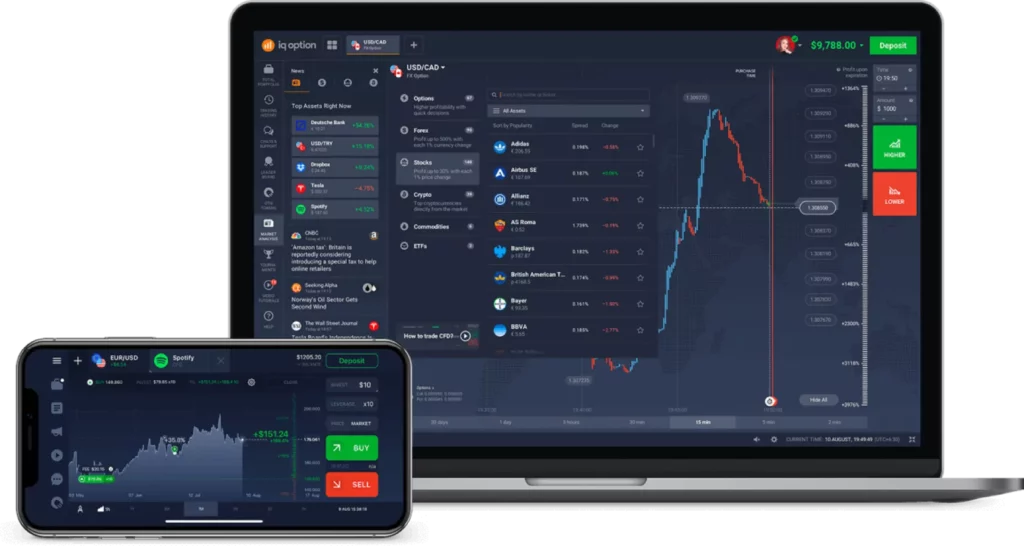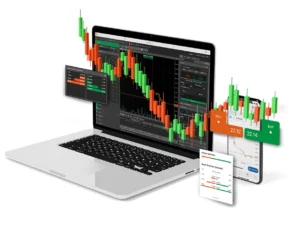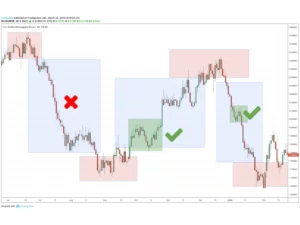Forex and stock trading are two of the most popular financial markets where traders aim to profit from price changes. Both markets involve buying and selling, but they work differently in structure, timing, and opportunity.
Forex focuses on trading currency pairs like EUR/USD or GBP/JPY, while stock trading deals with company shares such as Apple (AAPL) or Tesla (TSLA). Forex runs 24 hours a day, five days a week, making it more flexible, while stocks trade during set exchange hours. In practice, forex offers faster price movement and smaller costs, while stocks allow investors to build wealth steadily through dividends and long-term growth.
Market Hours and Accessibility
Forex operates around the clock, starting Monday morning in Sydney and ending Friday evening in New York. Stocks, however, trade only during exchange hours — typically 9:30 AM to 4:00 PM local time.
| Market | Trading Hours | Availability |
|---|---|---|
| Forex | 24/5 | Global sessions |
| Stocks | 6–8 hours/day | Per exchange |
Forex suits flexible traders, while stocks fit those who prefer a set routine.

What You Trade
In forex, you trade one currency against another. In stocks, you buy ownership in a company.
- Forex: EUR/USD, GBP/JPY, USD/CHF
- Stocks: Apple, Google, Microsoft
Forex trading focuses on exchange rate differences, while stock traders earn from price growth and dividends.
Market Size and Liquidity
The forex market moves over $6 trillion daily, making it the most liquid market globally. The stock market, though smaller, is still worth trillions but with lower daily volume.
| Market | Daily Volume | Liquidity |
|---|---|---|
| Forex | $6.6 trillion | Very high |
| Stocks | $200 billion | Moderate |
Higher liquidity in forex means tighter spreads and faster execution.
Volatility and Risk
Forex tends to move faster due to macroeconomic events like rate decisions or geopolitical news. Stocks often react to company performance or earnings.
- Forex: Interest rates, GDP, inflation, central bank policy.
- Stocks: Earnings reports, management changes, sector trends.
Forex provides more trading opportunities daily, while stock traders often wait for key earnings periods.
Leverage and Margin
Forex brokers offer high leverage, sometimes 1:500, while stock brokers usually cap it at 1:5.
- Forex: $100 controls $50,000 (1:500)
- Stocks: $100 controls $500 (1:5)
High leverage increases both profit potential and risk. Beginners should use small leverage, like 1:20, until consistent.
Costs and Spreads
Understanding trading costs is important before choosing between Forex and stocks. Both markets have different fee structures, and these can affect profits, especially for beginners. In Forex, the main cost comes from the spread — the small difference between the buying and selling price of a currency pair. Some brokers also add small commissions per trade, but many offer commission-free accounts with slightly wider spreads. Forex brokers may also charge overnight swap fees when positions are held past midnight.
Stock brokers, on the other hand, usually charge fixed commissions per transaction. Depending on the platform, investors may also pay account maintenance or platform usage fees. Some brokers offer zero-commission trading for certain markets, but they often recover costs through hidden spreads or service charges. Long-term investors in stocks also need to consider custody fees and taxes on dividends.
| Fee Type | Forex | Stocks |
|---|---|---|
| Spread | Yes | No |
| Commission | Sometimes | Yes |
| Overnight Swap | Yes | No |
Forex trading is generally cheaper for short-term and active traders because spreads are low and trades can be executed frequently with minimal cost. Stocks, however, are better suited for long-term investors who hold positions for months or years, where one-time commissions are less important than the potential for growth and dividends. Understanding these cost differences helps traders choose the market that best matches their trading frequency and budget.
Fundamental vs Technical Analysis
Both markets use analysis to make trading decisions, but the focus and tools differ depending on the market type. Forex traders often rely on economic indicators, while stock traders study company performance and financial health. Understanding these differences helps beginners choose the right analytical approach for their trading style and goals.
Forex Traders Use:
- Central bank announcements
- Economic data
- Global events
Stock Traders Use:
- Company earnings
- Market capitalization
- Dividend yield
Forex trading is driven mainly by global economic conditions and macro events that affect currency strength. Traders must monitor how one country’s economy performs against another. Stock traders, however, focus more on company fundamentals and investor confidence within specific industries. While forex reacts quickly to news and global policy changes, stock analysis often involves studying long-term value, stability, and growth opportunities. Many traders combine both fundamental and technical analysis for better accuracy — using charts for timing and news or data for context.
Which Is Better for Beginners?
Forex is often the easier choice for beginners because it requires a smaller starting balance, offers demo accounts for practice, and provides high market liquidity. This means traders can open and close positions quickly with minimal slippage, learning how to react to price movements in real time. Forex is also available 24 hours a day, five days a week, giving new traders the flexibility to trade whenever they have time. It’s a practical starting point for learning basic technical analysis, chart reading, and short-term decision-making.
Stock trading, on the other hand, suits people who prefer long-term growth and more predictable returns. Investing in company shares allows beginners to benefit from dividends and steady appreciation over time. However, it requires understanding financial reports, company fundamentals, and market cycles. Stocks are generally less volatile than forex, making them a safer option for those who can hold positions for months or years.
In reality, new traders can try both markets using demo or small live accounts to see which fits their goals better. Forex appeals to people who enjoy fast-paced trading and quick feedback, while stocks attract those who value slow, consistent growth. The best approach is to experiment with both, measure your comfort with risk, and decide which market matches your style, time commitment, and financial objectives.
Forex vs Stocks
Forex and stocks offer different paths for traders, with forex suiting those who want fast action and stocks fitting patient builders. Forex runs five days a week nonstop, while stocks follow exchange hours, creating varied opportunities. Knowing these differences helps pick the market that matches your time and risk style.
| Category | Forex Trading | Stock Trading |
|---|---|---|
| Market Hours | 24/5 | Limited |
| Capital Needed | Low ($100+) | Higher ($1,000+) |
| Volatility | High | Moderate |
| Leverage | Up to 1:500 | Up to 1:5 |
| Liquidity | Very High | Medium |
| Focus | Currencies | Companies |
| Best For | Active traders | Long-term investors |
Forex draws day traders with its leverage and constant flow, but stocks reward those who study company reports over years. Start small in either to test fit—many switch after trying both on demo accounts. Balance the two for a mixed portfolio if your schedule allows.
FAQs
Which is more profitable, forex or stocks?
Both can be profitable. Forex offers quicker returns but higher risk; stocks are slower but more stable.



